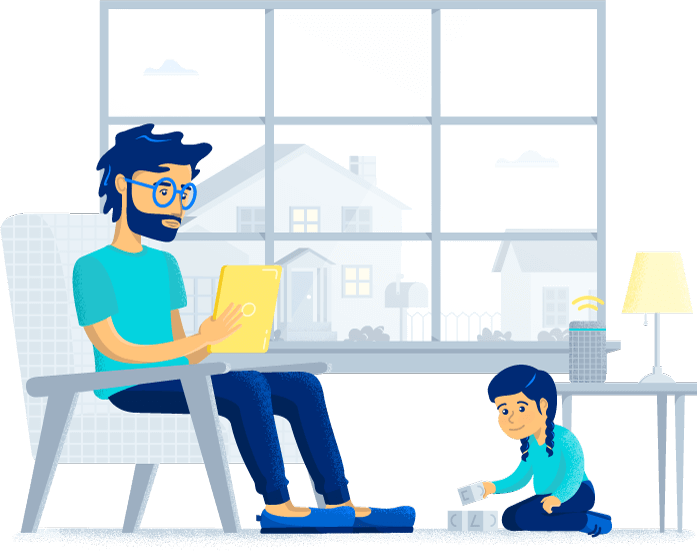If you’re a first-time internet buyer and feel intimidated by the process, you’re not alone. Most internet service providers (ISPs) make understanding what speeds you need (both download and upload), how much you will actually be paying each month and what type of equipment you need to either rent or buy as confusing as possible.
On top of all that, you will also want to consider contracts, data caps and installation. It’s a lot to think about but we have broken it down for you so you can be sure that you are getting exactly what you need for the best deal possible.
1. Find internet providers near you
The first step to buying internet is to find internet service providers (ISPs) available in your area. ISPs are not available everywhere; even if your neighbor has a certain ISP, it may not be available at your home, which is why Allconnect asks you for your address. We can help you find the right provider for you, whether you’re looking for cheap internet, fast internet or rural internet.
2. Determine the type of internet you need
When determining the type of internet you need, it’s important to consider both technology types and the speed you need.
There are different internet technology types you can choose from: Satellite, fiber, cable and fixed wireless. Your location may narrow this choice down since some tech types aren’t widely available, but cable and fiber generally offer the fastest internet connection.
You also need to decide how much speed you need, and this depends on the number of people in your household and the types of internet activities they will partake in.
Download speeds
Download speeds are the main concern for most consumers and is the speed that is advertised by internet providers. Download speeds measure the time it takes to download data in order to perform activities, such as watching videos, browsing the internet or downloading files. The faster the internet speeds, the faster one can perform these tasks. The more devices there are connected to the internet at a time, the faster the download speeds will need to be.
25 Mbps is the minimum broadband download speed standard, but we recommend at least 100 Mbps. If you have more than two people in your home using devices simultaneously, you should look for even more speed.
Upload speeds
With most providers, your upload speeds will be considerably slower than your download speeds. Most of what people do on the internet is download, so fast upload speeds are not nearly as important as fast download speeds. However, if you routinely live stream or game, make video calls, send emails or upload files, you will want to ensure sufficient upload speeds.
The FCC classifies upload speeds of at least 3 Mbps as high-speed internet; however, we would recommend at least 10 Mbps for the average household. The speeds you will be able to receive for uploading is largely dependent on the type of internet service you have. For instance, fiber internet companies are able to provide significantly faster upload speeds than DSL or satellite companies. Cable internet providers tend to be more in the middle.
Learn more about popular internet speeds.
A good rule of thumb to follow for determining the speeds you need
Divide the number of devices in your household by the speed plan you are considering. You will want the result of that equation to be between 25 and 40 Mbps. For instance, if you have a household of four people who only use one device at a time, then a plan around 100 Mbps will be best (100/4 = 25).
If everyone in your household uses multiple devices at a time, however, you will want to consider a slightly faster plan. If each person in your household of four uses two devices at a time (a smartphone and a laptop, for example), then consider a plan between 200 and 300 Mbps (300/8 = 37.5).
3. Compare ISPs available in your area
Now that you know what connection type and internet speed you want, compare the ISPs available in your area.
Look at the plans they offer and compare them by price, speeds, hidden fees, contracts, equipment costs, etc.
Promotional vs. standard pricing
It’s important to know that all pricing advertised for internet service for new customers is, in most cases, a promotional rate. This means that after a certain period of time, usually 12 months, your internet bill will increase to the plan’s standard price. Unless the internet plan you are considering specifically says “Price for Life,” expect that your bill will increase anywhere after 3 to 24 months once you begin your service. The difference in price between the promotional rate and the standard pricing is usually between $5 and $60/mo.
Equipment and installation fees
Other important costs to factor in when buying internet are equipment and installation fees. In order to access the internet, you will need a modem device and to access the internet wirelessly, you will need a router. All internet providers will offer to rent you their own equipment, which is a good option if you want access to customer support if something goes wrong with your equipment; however, the more economical option is to buy your own modem or router and Wi-Fi router, or modem/router combo device. Modems and routers usually cost between $60 and $200 per device.
You will also want to pay attention to installation fees. Most providers offer the choice of free (or close to free) self-installation or professional installation. Professional installation can cost anywhere between $50 and $150. Sometimes you can get the fee waived, however, if you purchase your internet plan online. Factor in the installation fee when considering how much you will end up paying in total for the first year.
Learn more about buying vs. renting equipment
Learn more about hidden internet fees
Contracts
Before selecting an internet provider, determine what type of contract makes the most sense for you. Although many providers now offer monthly instead of long-term contracts, some still stick to the one- or two-year contract agreements.
If you are considering entering into a two-year contract, make sure you can commit to that because ending a contract early can lead to early termination fees. The way most providers structure early termination fees is that for every month you have left in your contract, your provider will charge you a fee.
Data caps
A data cap is when internet providers put a cap on the amount of internet a customer is allowed to consume each month. Some internet service types are more likely than others to impose data caps, including cable, DSL, satellite and fixed wireless internet. Most fiber optic companies, in contrast, rarely impose data caps.
Don’t worry too much about data caps, however, as caps are usually far higher than what the average customer requires. For instance many ISPs impose a 1TB data cap but the average user doesn’t even consume close to that.
Learn more about average data usage
4. Choose an ISP and internet plan
Once you understand the various aspects of internet pricing and speeds, you will want to combine this information to determine what plan and provider is best for you. We would recommend a fiber optic provider if it’s available at your home due to its faster speeds, competitive pricing, lower latency and fewer data caps.
The bottom line
Buying internet can sometimes be overwhelming, and in general internet has some pain points. Remember to keep an eye out for hidden fees, promotional vs. standard pricing and other factors like contracts and data caps when choosing your provider. Also, look for a provider offering the best value for your money; one ISP may offer a cheaper plan, but another could offer more speed, a higher data cap and no hidden fees for not too much more per month.
Shop internet providers, plans and speeds in your area with our internet experts. We’ll help you find and compare plans with good internet speeds for your home and unique needs.
Allconnect: Let us compare providers for you
Why should you choose Allconnect? We’re the #1 broadband marketplace in the U.S, meaning you can trust us to search, compare and order internet and TV service for your home.
Get started

Written by:
Camryn Smith
Cammy is a writer with Allconnect, growing her broadband industry knowledge for over a year on the internet marketplace. Her expertise lies in home internet and broadband service with a focus on providers, plans…
Read more
Edited by:
Robin LaytonEditor, Broadband Content
-
Featured
![How to lower your internet bill]() How to lower your internet bill Camryn Smith — 6 min read
How to lower your internet bill Camryn Smith — 6 min read -
Featured
![Everything you need to know about internet speeds]() Everything you need to know about internet speeds Robin Layton — 8 min read
Everything you need to know about internet speeds Robin Layton — 8 min read -
Featured
![10 questions you should ask before choosing an internet service]() 10 questions you should ask before choosing an internet service Ari Howard — 7 min read
10 questions you should ask before choosing an internet service Ari Howard — 7 min read
Latest
-
Thursday, July 25, 2024
Worried about losing your signal? This is how to keep your satellite dish cleanDavid Anders — 6 min read
-
Tuesday, July 23, 2024
The best free TV and movie streaming services 2024Camryn Smith — 5 min read
-
Tuesday, July 23, 2024
Everything you need to know about internet speedsRobin Layton — 8 min read









